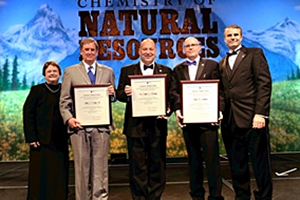Catalyzing Collaboration and Conversation at the Nation's Largest Chemistry Gathering

2015 Affordable Green Chemistry recipients John Frye (second from left), Todd A. Werpy (center), and Alan H. Zacher (second from right) are presented their award by Dow Chemical VP Florian J. Schattenmann (right) and Diane Grob Schmidt, ACS President (left).
A solitary chemist in a science lab is an image best left to movie screens. Today's scientists are connected. At the Institute for Integrated Catalysis, led by Pacific Northwest National Laboratory, researchers conduct studies, write reviews, and mentor scientists from around the world. For example, Janos Szanyi, Chuck Peden, and Feng Gao worked with experts at University College London to discuss the current state of the science on two heat stable zeolites for controlling automotive emissions. This type of connection often occurs online or in the lab around a specific project. But, at the American Chemical Society spring meeting, scientists shared ideas, recognized their peers, and focused on a broader topic.
The theme of the 249th ACS National Meeting and Exposition, March 22-26, Denver, was the chemistry of natural resources. Catalysis scientist Bob Weber, IIC, selected the topic as program planning manager. The theme encompasses not only extracting and refining precious metals and fossil fuels, but also challenges to the environment and the next generation of energy generation and storage.
"The challenges include water consumption related to energy and biofuels; conservation, reuse and recycling of resources; and identifying alternative materials," said Weber. He also took the time to co-organize and chair a symposium on biomass research chemistry.
These materials challenges are easily seen in the quest to store solar energy as chemical fuels. Monte Helm and Aaron Appel co-organized a symposium to share the latest research on catalysts for solar fuels. "The symposium brought together prominent and early-career researchers studying catalysis of small molecules for generating and using chemical fuels," Helm said after the meeting. "I was impressed with how far the field of solar fuel production has come."
Discussion was not just about the future of energy. Today's coal-fired power plants are the nation's top source of carbon dioxide emissions. David Heldebrant organized and led a discussion on the state of the science in creating negative carbon dioxide emission technologies. Heldebrant just received a 2015 U.S. Department of Energy early career research award. He will be spending the next 5 years discovering how molecular processes work when carbon dioxide interacts with carbon-capture solvents.
The ACS event also offers scientists a chance to recognize their peers. Donald Truhlar, University of Minnesota, was honored for his work in advancing computational tools. Three of Truhlar's peers organized a series of talks in his honor. Bruce Garrett at PNNL with Jiali Gao, University of Minnesota, and Benedetta Mennucci, University of Pisa, chose a series of outstanding presentations. Each talk touched on the central role of theory and computation in understanding molecules in gas and condensed phase systems. Together, the group discussed findings and ideas that one day could lead to high-capacity batteries or new biofuels.
Also celebrated at the event were the ACS Affordable Green Chemistry award winners. IIC team members Alan Zacher and John Frye, and Todd Werpy, formerly with PNNL, were recognized for successfully applying a catalytic process to economically synthesize propylene glycol. The chemical is used to manufacture plastics and other products. The team's process creates the chemical from renewable and not fossil sources. PNNL held a reception in the team's honor.
For 50 years, scientists from Pacific Northwest National Laboratory have attended events large and small hosted by the American Chemical Society. The events offer a chance to share the research done at the laboratory, to learn more than before, to contribute to the society through serving on committees and boards.

